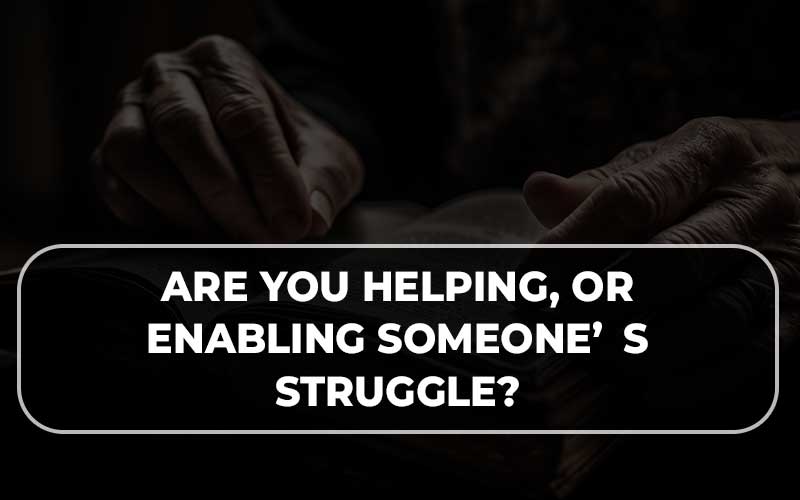Let’s dive into a real talk for us Christians—something that hits home: Are You Helping, or Enabling Someone’s Struggle? It’s like walking a tight rope between love and tough love, right? Now, picture this: you’ve got a friend, a family member, or maybe even yourself navigating a tough spot. The big question is, are your actions a lifeline or inadvertently fueling the struggle?
Are You Helping, or Enabling Someone’s Struggle
Galatians 6:2 (NIV):
“Carry each other’s burdens, and in this way, you will fulfill the law of Christ.”
Proverbs 19:20 (NIV):
“Listen to advice and accept discipline, and at the end you will be counted among the wise.”
James 5:16 (NIV):
“Therefore confess your sins to each other and pray for each other so that you may be healed. The prayer of a righteous person is powerful and effective.”
Proverbs 27:17 (NIV):
“As iron sharpens iron, so one person sharpens another.”
1 Thessalonians 5:14 (NIV):
“And we urge you, brothers and sisters, warn those who are idle and disruptive, encourage the disheartened, help the weak, be patient with everyone.”
Proverbs 3:12 (NIV):
“because the Lord disciplines those he loves, as a father the son he delights in.”
Matthew 18:15 (NIV):
“If your brother or sister sins, go and point out their fault, just between the two of you. If they listen to you, you have won them over.”
So, here’s the deal: helping is like tossing a lifebuoy to someone drowning, while enabling is handing them an extra weight. It’s a fine line, and we often tiptoe on it without even realizing. Take a moment to reflect—have you ever found yourself caught in the web of enabling, thinking you’re doing the right thing?
Let’s break it down. Helping involves actions that genuinely uplift and empower. It’s offering support, encouragement, or even a listening ear. When your friend is down, helping is being there with a cup of coffee, a hug, and maybe some solid advice if they’re open to it. It’s about empowering them to stand on their own feet.
On the flip side, enabling is a bit trickier. It often stems from a good place—maybe a desire to shield your loved one from pain or consequences. But here’s the catch: enabling doesn’t fix the problem; it perpetuates it. It’s like handing an umbrella to someone in the rain without encouraging them to find shelter. Enabling provides temporary relief but doesn’t address the root issue.
Consider this scenario: your friend has a habit that’s harmful—could be an addiction, financial irresponsibility, or toxic relationships. You, with the best intentions, might step in to cover their debts, make excuses for their behavior, or rescue them from the consequences. Seems noble, right? But here’s the kicker: you’re inadvertently becoming part of the cycle that maintains their struggle.
Now, don’t get it twisted; this isn’t about abandoning your people in their tough times. It’s about finding that sweet spot between support and accountability. It’s about distinguishing between a hand up and a handout. Instead of rescuing, try encouraging them to take steps toward change. It might be nudging them toward professional help, setting boundaries, or facing the consequences of their actions.
In the Bible, there’s this nugget of wisdom in Galatians 6:2: “Carry each other’s burdens, and in this way, you will fulfill the law of Christ.” Notice it says “burdens,” not “backpacks full of excuses.” There’s a beauty in supporting one another, but it doesn’t mean shielding someone from the consequences of their choices.
Let’s sprinkle in a dash of tough love. It’s not about being heartless; it’s about being courageous enough to say, “I love you, but I won’t be part of this destructive dance.” It might feel uncomfortable, and they might not thank you for it right away, but sometimes the most loving thing you can do is let them face the music.
Imagine this: a friend struggling with addiction. Helping is being there for them as they seek professional help, attending support groups, and celebrating their victories. Enabling is covering up for missed responsibilities, making excuses, and perpetuating a cycle of dependence. See the difference?
Now, let’s talk boundaries—a word that sometimes gets a bad rap. Boundaries aren’t walls; they’re guardrails that keep everyone on the road to healthy relationships. Setting boundaries might mean saying no to requests that enable destructive behavior or refusing to participate in covering up mistakes.
In a nutshell, it’s about fostering independence instead of dependence. It’s cheering them on as they navigate their struggles, not carrying them on your back. It’s standing by their side, not in their way. And guess what? This approach aligns with the core of Christian values—love, compassion, and accountability.
So, the next time you find yourself in the tug of war between helping and enabling, pause for a moment. Ask yourself, “Am I truly helping them stand on their own, or am I inadvertently adding more weight to their struggle?” It’s a journey, not a one-time decision, but by navigating this with wisdom, love, and a sprinkle of tough love, you can be a beacon of support without enabling the very struggle you aim to alleviate. After all, in this messy, beautiful journey of life, we’re all learning to walk the fine line between compassion and accountability.
Prayer
Express your commitment to praying for them and their situation through verbal affirmation. While this may seem like an obvious step, it’s crucial to ensure that people feel supported even when other actions are being taken. Take the initiative to connect with the person, reinforcing your care for them and expressing your optimism about their well-being. By maintaining a healthy boundary, you convey your concern for their situation and your belief in its improvement.
Also Read: Is Rahab the Ancestor of Jesus?

